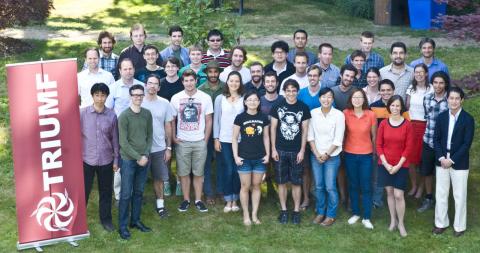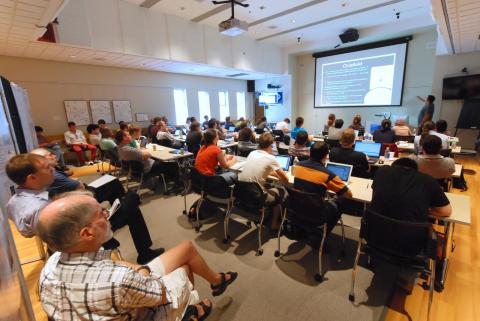

Claire David is a graduate student at TRIUMF where she performs data analysis with ATLAS. From July 1 – 12, 2013, she took part in TRISEP (Tri-Institute Summer School on Elementary Particles), which is offered to graduate students from around the globe. This is her first–hand-account of the experience:
TRISEP. Tri-Institute Summer School on Elementary Particles. The acronym created some humourous confusion. A speaker placed a picture of a triceratops skeleton on his slide. On the boat at the dinner cruise banquet, the reserved tables were labelled "Booked for Tricep," If this had been paired with the dinosaur image, it could have been a dissuasive, muscular warning not to sit there...
Personally, I found the name quite classy. And it was. TRISEP is the union of three prestigious Canadian laboratories in the High Energy Particle physics world. TRIUMF, Canada’s national laboratory for particle and nuclear physics, where I work as a graduate student; SNOLAB, an underground facility specialized in neutrinos and dark matter; and Perimeter Institute, the quintessence in terms of Theoretical Physics. As I said, classy.
Like our Universe, everything has a start. The first TRISEP session was held this year at TRIUMF, located on the Southern end of UBC campus. Forty young and fresh (at the start) graduate students gathered in the heavily air-conditioned auditorium to learn about subatomic physics during 12 intense days. In this small class, much of the globe was represented: the Americas through Canada, USA, Mexico, Colombia and Peru; Europe through France, Germany, and Italy; the Middle-East through Egypt and Turkey; and Asia through Pakistan, India, China, and Japan.
Although the students shared a common educational background in physics, everyone specialized in their own field of research. During the course, I met other fellows from ATLAS and CMS’s big families. I could rapidly identify the future theorists while listening to their very abstract questions after the sessions. Some neutrino people were present as well, which was the occasion to learn from them and be more democratic towards the particle that, since I work for a multipurpose detector not sensitive to it, am always used to referring to as the insulting "missing transverse energy" sticker...
It was clear the organizing committee took an effort in finding the best speakers. We were spoiled; leading experts came to give very condensed summaries of their field. These all managed to fit into only four or five one-hour sessions, split with long breaks before the next topic. To make digestion easier, some lecturers used humour. Others were on-hand to deepen key notions that came up during small group discussion time in the afternoons. In any case, the final collection of slides provided a recap with all the essentials, neatly stored as reference in our documents for the rest of our careers. Not to mention the video database with a search option so that the recorded lecture starts right at the chapter we want (the communication people impressed the crowd while presenting the online repository).
Doing my Ph.D. in experimental particle physics, I have always wanted to take the time to learn more about key tools such as statistics, discover what is in the "black box" of our simulated data for instance, or go back to pen-and-paper and derive some cross-sections in order to understand the whole chain of my research from its theoretical roots. But no time. Deadlines, plots. This school did it for me. The program was perfectly adequate for my wishes. Not only were most of my questions answered, this training also brought light to some foggy concepts I was always curious about. Moreover, it gave me a broad overview in various domains, some overlapping with my research. Now I feel more confident talking about the propagation of correlated errors. I derived the Higgs decay width into bottom-antibottom quarks—the analysis decay channel I’m intimately familiar through my research! And even if I am not in neutrino physics, I now understand the basics as well as the past and current experiments, which I consider a required part of scientific culture.
Something important to mention: I was taking this School for credit. When the others were enjoying outdoors activities such as climbing the challenging Grouse Grind or splashing the poor organizers while kayaking, I was indoors with the other few colleagues who had also signed up to be graded. We were sweating and enjoying life in a different way... we had to do all the assignments, while the other students could pick and choose. In spite of the fast pace, we had fun learning so much in so little time. In truth: there was not one TRISEP, there were two TRISEPs. The participants also became part-time teachers. Indeed, the mutual aid between each physicist apprentice was crucial to engrave a newly learned concept. And we did well: those more theoretically inclined were regularly consulted for the tough abstract topics in Quantum Field Theory. I, along with other colleagues working for ATLAS, added our expertise for questions requiring programming and guiding those not used to writing a little plotting macro. This exchange of skills, as well as jokes and food (necessary brain-oil to stay up late), united us for the better. In the end, totally sleep deprived, we pushed ourselves even more and we managed to cover almost everything. It was an intense cognitive marathon but extremely self-rewarding.
Now ... back to research. I am quite nostalgic, already. Quoting an ex-TRISEPer: "The worst thing that can happen in your research is... an interruption of your research". Well, TRISEP provided a "boosted" training. I consider it as a great time investment. I would totally advise any graduate student to go to next summer’s TRISEP 2014 at SNOLAB, or at Perimeter Institute in 2015. I’ve warned you —this is going to be intense, intellectually, physically, and even socially (although I had to skip the excursions, I heard that participants enjoyed them so much that in the evening they collapsed on their bed like a low energetic wave function). Now that the homework is done, I ask, what is even worse than an interruption in your research? A longer interruption. Okay I should go back to my code now.
Yours elementary,
Claire David
